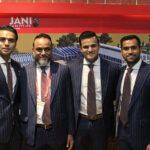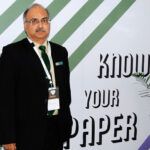Yash Pakka provides agri-residue pulp, which is mostly made of bagasse or sugarcane waste. It provides pulp in both bleached and unbleached varieties. An important feature of Yash’s product is that 95 percent of the cooking chemicals used to manufacture the pulp are recovered by the company’s conventional chemical recovery cycle making the pulp even more environmentally friendly. Yash’s molded products are also made from bagasse. Yash’s product range focuses mainly on the food industry — compostable disposables for food service and egg trays for food storage and transportation. As the Company wants to make the world a cleaner place, it produces compostable packaging. It wants to ensure that whatever gets thrown is good garbage. The facilities at Yash Pakka are completely off grid and based on 100 percent biomass based – energy before chem recovery.
Ved Krishna, Strategy Head, Yash Pakka Limited, talks about his Company and its environmentally friendly product portfolio in an absorbing interview given to Paper Mart.
Excerpts.

Paper Mart: What made you change the name of your Company from Yash Papers Limited to Yash Pakka Limited?
Ved Krishna: That’s a good question! We’ve been called Yash Papers for 38 years. We realized that we were slowly getting more and more into compostable packaging. Paper remains the base, but most of our pulp is going into bags, flexible packaging and molded products. We felt that only paper doesn’t give the right impression of what the Company does. So, after much research, we decided on choosing a name that has to do with packaging, and we are now called Yash Pakka. In the Egyptian language, ka means ‘soul’. We felt that all the work we were doing was about doing things with a good heart for the planet. So, the name Pakka means ‘packaging with a soul’.
PM: When did you change the name of your Company?
VK: We approved the name in our last Board meeting. And that happened a month before the inauguration of Paperex 2019. As you already know, we launched CHUK at Paperex 2017. We did that because we knew we would be meeting most of our customers and dealers during the exhibition and that we would get an excellent opportunity to tell them about our new brand.
PM: What is CHUK?
VK: CHUK is one of our brands. It is our range of compostable packaging tableware that is safe to eat from and 100 percent biodegradable. It is made out of sugarcane leftovers. The brand aligns with our philosophy of a sense of purpose for leaving the planet, through our actions, better than it was found and for our customers to have a fun with our products. We want our partners – food service outlets and food packaging companies and their customers – to have a memorable and guilt-free experience without the worry of creating a mess before, during or after the meal.
We chose “CHUK” because the meaning of the word represents all the elements we believe and want to share with our customers, people, products, and organization. The word CHUK means to “throw something away”. The expression chuk de means “to lift”. CHUK in Hindi means “to taste”. In our area, CHUK also means “land”. We make molded products like containers, plates, bowls, trays, and lids from bagasse.
CHUK is ovenable, microwaveable and freezable. It is not plastic-coated. Its sturdy design will not let your yummy biryani fall, but yet lightweight enough to make packing easy. There is no aroma migration so customers will be happy their butter chicken smells as delicious as it is meant to. Made out of natural fibres, you can be sure that there are no toxins in it.
Of course, you don’t want to feed your family carcinogens? Bisphenol A, a compound found in plastics, leaches out 55 times faster when exposed to hot liquids than it does under normal conditions. CHUK, on the other hand, is an FDA-certified product made from agricultural residues, not plastic.
PM: Could you tell us a little bit about the other products you offer?
VK: We don’t do anything outside the food segment. We focus on three broad areas. One of them is bags – strong, thin, lightweight, grease-resistant and water-resistant bags with wet tensile strength and burst strength for carrying different food products. The great thing about these bags is that they are made from sugarcane waste. Of course, all our products are innovation-oriented. The second area is flexible packaging. You have instant noodles packs in this area. We concentrate on finding substitutes for multilayered packaging for things like snacks, potato chips, chocolates, etc. So, the first product we have launched is for non-aromatic products, which includes rice, pasta, noodles, pulses, etc. We can pack these things in flexible packaging material. Flexible packaging is again a product that our team has created. We are now trying to promote this packaging. And the third area is molded products. These again are for food services.
PM: You said that you use sugarcane leftovers to make your products. But don’t you think sugarcane is a big water guzzler?
VK: Crops that are grown on a yearly basis – such as rice, wheat and vegetables – take a lot of water. Trees, including eucalyptus, take less water. We need to keep in mind that we don’t use sugarcane as such. We use the stuff that sugar mills throw away. If this leftover is not used, it would be burnt to generate power or something else. We use waste material only. You see, we want this planet to be cleaner – that runs across whatever we do. We produce our own electricity. We are not connected to the grid. Our electricity is made from rice husk, which again is a waste product. We recover almost 95 percent of our chemicals.
PM: What about the availability of water? Is that a challenge for you?
VK: Yes, we are facing this challenge. The earth has a limited amount of water. As one of my friends, Mr. Pawan Agarwal of Naini Paper says, water should be used for drinking purpose only. As a paper manufacturer, we use a lot of water despite a reduction of water consumption. But we need to find a solution to this problem if we want to keep using water.
PM: What are your future targets?
VK: In the next few years, we will focus on the food segment. We will develop the products we have recently launched, especially our molded products. We want to become world leaders in these products so that we could make a positive impact on the earth. One of our goals is that in the next four to five years, nothing in India is served in single-use plastics.



